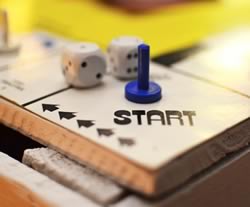John Hall* says playing board games is one of the best ways to help people develop valuable real-life skills for the workplace.
 I thoroughly enjoy playing King of Tokyo with my daughter because it gives us a chance to spend quality time together.
I thoroughly enjoy playing King of Tokyo with my daughter because it gives us a chance to spend quality time together.
But I’m really a fan of the fact that playing games, like King of Tokyo and even UNO, helps her understand strategy.
It’s incredible how these games have pushed my daughter to think more strategically.
What’s interesting is that after this observation within my own family, I began to notice that many of the strategic thinkers I’m surrounded by also play board games frequently.
That got me thinking: Is there a correlation between board games and becoming more strategic?
I decided to do a little research and combine it with my own personal experiences to answer that question.
What I discovered was that board games are one of the best ways to help people develop valuable real-life skills, such as anticipating next moves in the workplace.
Games help you learn how to cooperate and communicate with others.
When I was much younger, I had a group of friends who would play games like Risk and Axis & Allies.
What I quickly realised was that unlike purely competitive games like Monopoly, you had to work as a team if you wanted to win.
You and your teammates had to have the same goal.
You needed to clearly communicate your plans and thoughts with each other.
Collectively, you had to develop a game plan in order to defeat your enemies.
It wasn’t uncommon to take breaks to update our strategies with our comrades as the game progressed.
And, if we weren’t on the same page, you could be certain we would be on the losing end.
Because of this need to build allegiances, board games can strengthen relationships.
“I grew up playing board games with my family, and we had the best conversations about life and learning around them, because they gave us turn-taking and rules and fairness,” Mary Flanagan, a Professor of Film and Media Studies at Dartmouth College, told The Atlantic.
“Board games structure social interaction in a really safe and helpful way.”
“Face to face conversation is getting weirder and weirder.”
“Board games help us get along and communicate.”
That’s crucial in the workplace.
As Babe Ruth famously said, “The way a team plays as a whole determines its success.”
“You may have the greatest bunch of individual stars in the world, but if they don’t play together, the club won’t be worth a dime.”
Games make you happier and decrease your stress.
A game can stir up competition and encourage us to focus on a goal.
As a result, this releases endorphins, aka the body’s natural “feel-good” chemicals.
They can also make us laugh, clear our minds, and alleviate stress.
In fact, research shows that 53 per cent of people play games for stress relief.
When you’re in a better mood, you tend to be more content and compassionate.
Because you’re not at peak stress, you’re able to focus and concentrate on your team’s priorities.
You’re also less likely to snap at team members when they make a mistake or ask a question.
Games encourage you to set goals and remain patient.
Not only do games help you develop a strategy and share a goal with your team, but they also boost your patience.
Think about all of the board games you’ve played.
Some of them take hours!
Crafting a strategy and developing the patience to see it through are both beneficial skills at work.
You need to establish “why” you’re doing what you’re doing and inspire others to buy in.
Games help you read people.
You may not realise it, but the ability to identify people’s body language and tone of voice is an essential life skill.
If you misread someone, you could offend them, become defensive yourself, swallow a lie, or not pick up on their lack of interest.
Thankfully, there are plenty of games where learning to read people is at the centre of the gameplay.
Games increase creativity and self-confidence.
This shouldn’t come as a surprise, but board games enhance your cognitive and creative skills.
Whether it’s chess, Scrabble, Chutes & Ladders, or Stratego, playing games can develop unique analytical and problem-solving skills to predict your opponent’s next move or manoeuvre your way out of a sticky situation.
Consequently, by developing a stronger sense of creativity and individuality, you can stop second-guessing yourself.
That may not sound important, but a decisive approach can be the difference between holding a team up or completing a project by deadline.
Games promote time management and prioritisation.
Time management is a big deal when you work with a team.
As stressful as missing a deadline is, just imagine how the rest of your colleagues feel when you’re the person forcing them to finish an assignment after-hours.
While there are a variety of time management techniques you can try, the most effective strategy is identifying your priorities.
This allows you to focus on what’s most important so you can ignore everything else.
Some board games have strict time limits, so you and your team must prioritise your every move to escape.
This is a way to learn to cut to the chase in a low-stakes environment.
If you’re looking to sharpen your skills and become a stronger link on your team, play a board game.
Board games aren’t just fun — they’re one of the best ways to become a more strategic teammate, both inside and outside the office.
* John Hall is co-founder and CMO at Calendar.com.
This article first appeared at www.inc.com.











